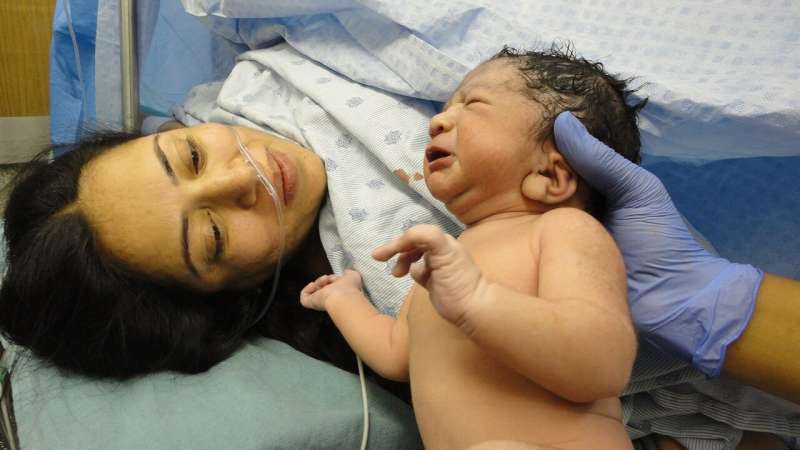This article has been reviewed according to Science X's editorial process and policies. Editors have highlighted the following attributes while ensuring the content's credibility:
fact-checked
reputable news agency
proofread
Morgan State University leads nationwide research on maternal health disparities

Led by Morgan State University, a coalition of colleges across the nation is researching maternal health disparities. The Baltimore university will coordinate its efforts and those of 15 other schools, almost all of which serve a large percentage of minority students.
They're all working toward a better understanding of why mothers of color are put at a higher risk during pregnancy and childbirth than their white counterparts. Participating universities include the Morehouse School of Medicine, Ohio State University and the Texas A&M University System Health Science Center.
Half of Maryland's eight congressmen, U.S. Reps. Steny Hoyer, Glenn Ivey, Jamie Raskin and David Trone, all Democrats, serve on the caucus, which championed the creation of the research network.
Morgan State was chosen to be the hub for the 16-university project due to its unique approach, said HRSA Administrator Carole Johnson. HRSA was compelled by Morgan State's proposition to conduct research "in dialogue with the community," Johnson said, in contrast with high-level "ivory tower research" detached from the affected parties.
"They are thinking about it really holistically," Johnson said.
However, to Yvonne Bronner, a professor in Morgan State's School of Community Health and Policy who's studied maternal health for 40 years, starting this kind of research at the community level is simply common sense.
Bronner, who's leading the project, said she understands individuals have hesitations about being studied for science; that's why she's taking a sociological approach.
Her team is spending its first of the five research years investigating the history of maternal health in the communities surrounding the colleges. They're examining how pregnancy and childbirth outcomes for mothers have differed based on race over time and the factors that have given way to a cycle in which Black moms are nearly three times more likely to die from pregnancy issues than white moms, according to a 2021 report from the CDC.
Next, the team will assess what community resources currently exist to help close that gap and examine how racial disparities manifest in the lives of mothers in the present day—how they face different challenges in feeding their families and securing safe and stable housing.
"At the end of year two, if we've done our work well, the community should start to tell us what the next step should be in our research," Bronner said.
The schools will focus on answering different research questions throughout the process. Morgan State is looking specifically at the effectiveness of doulas, nonmedically trained birthing assistants, which research indicates can be hugely beneficial to Black moms navigating the childrearing process.
They'll also be examining ways to hook doulas into Medicaid more easily. It's that practical approach to working off known solutions that particularly excited Johnson's team about Morgan State.
"We know these interventions work," Johnson said. "We need to actually integrate them into the system so women don't have to go seek them out separately."
To get a large research effort like this completed "money is only one piece to the puzzle," Bronner said. Another is finding enough qualified research professionals to carry out the job. That's proved to be challenging.
Universities aimed to serve mostly students of color have historically not provided academic opportunities to study maternal and child health, Bronner said, adding that she received her education in the subject from a predominantly white institution, Johns Hopkins University.
That knowledge gap is an issue Bronner's team is still working to address, and, due to the constraints of the grant, it's something they're needing to do concurrently with the research itself.
The solution they settled on was making the research an applied form of training. Students from a variety of academic disciplines at the 16 universities trained for eight weeks over the summer, studying the racial disparities and preparing to engage their local communities in discussions on the needs.
Each school will offer paid fellowships to students to conduct research using the money from the grant. That's a game changer not only for the project, but also for the students, Bronner said.
They'll "be paid to think," she said. "That's an alien construct to many of our students."
Once all the information is collected it will be time to develop solutions. Coming from a preventive health background, Bronner is more interested in understanding what can be done to stop moms of color from experiencing health, financial and mental health issues way before they're even pregnant. She already has a theory.
"We've got to destigmatize, demystify sex education," she said. "That's a huge, beautiful thing that should happen to you, to have a baby, but why in the world would we want a baby to come into an environment that is totally unprepared, to people who are totally prepared. That is a societal failure that we need to address."
The research network will receive its second year's financial installment at the start of the next federal fiscal year in October 2024 if Congress proceeds on its regular timeline, Johnson said. However, she added, the next three years of funding are in the hands of the subsequent administration and congressional leaders.
2024 Baltimore Sun. Distributed by Tribune Content Agency, LLC.




















